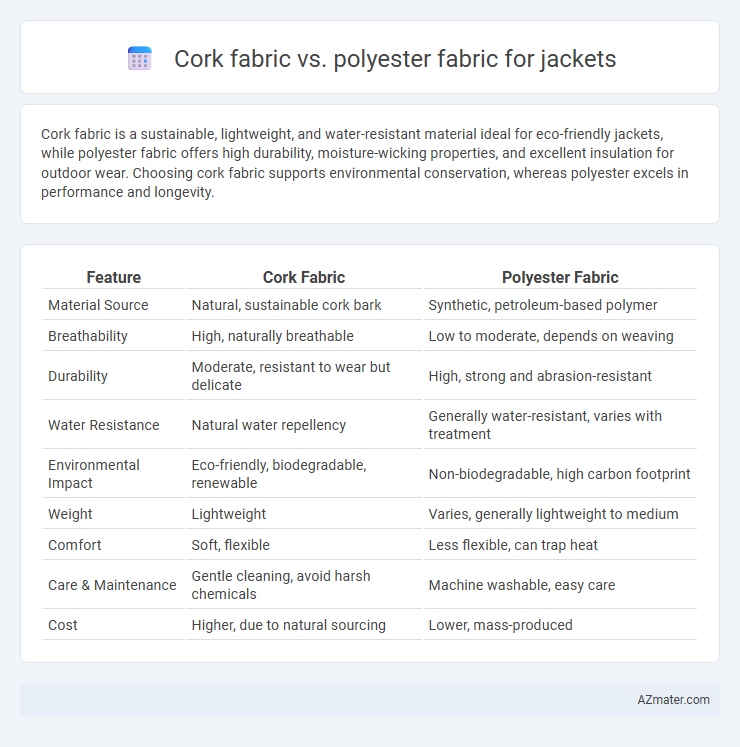Cork fabric is a sustainable, lightweight, and water-resistant material ideal for eco-friendly jackets, while polyester fabric offers high durability, moisture-wicking properties, and excellent insulation for outdoor wear. Choosing cork fabric supports environmental conservation, whereas polyester excels in performance and longevity.
Table of Comparison
| Feature | Cork Fabric | Polyester Fabric |
|---|---|---|
| Material Source | Natural, sustainable cork bark | Synthetic, petroleum-based polymer |
| Breathability | High, naturally breathable | Low to moderate, depends on weaving |
| Durability | Moderate, resistant to wear but delicate | High, strong and abrasion-resistant |
| Water Resistance | Natural water repellency | Generally water-resistant, varies with treatment |
| Environmental Impact | Eco-friendly, biodegradable, renewable | Non-biodegradable, high carbon footprint |
| Weight | Lightweight | Varies, generally lightweight to medium |
| Comfort | Soft, flexible | Less flexible, can trap heat |
| Care & Maintenance | Gentle cleaning, avoid harsh chemicals | Machine washable, easy care |
| Cost | Higher, due to natural sourcing | Lower, mass-produced |
Introduction to Cork Fabric and Polyester Fabric
Cork fabric is a sustainable, natural material harvested from the bark of cork oak trees, valued for its lightweight, water-resistant, and breathable properties, making it an eco-friendly choice for jackets. Polyester fabric, a synthetic fiber derived from petroleum, offers durability, wrinkle resistance, and moisture-wicking capabilities, commonly used in performance and everyday outerwear. Choosing between cork and polyester depends on priorities like environmental impact, texture, and functionality in jacket design.
Key Characteristics of Cork Fabric
Cork fabric is a sustainable, lightweight material known for its natural water resistance, breathability, and durability, making it ideal for eco-friendly jackets. Unlike polyester, cork fabric is hypoallergenic, biodegradable, and offers excellent insulation properties while maintaining flexibility and softness. Its unique texture and resistance to abrasion contribute to long-lasting, stylish outerwear with minimal environmental impact.
Key Characteristics of Polyester Fabric
Polyester fabric for jackets is known for its durability, wrinkle resistance, and moisture-wicking properties, making it ideal for activewear and outdoor use. It offers excellent color retention and quick-drying capability, enhancing both aesthetic appeal and functionality in various weather conditions. Unlike cork fabric, polyester is lightweight and highly affordable, providing a practical option for budget-conscious consumers seeking performance and ease of care.
Environmental Impact: Cork vs Polyester
Cork fabric, harvested from the bark of cork oak trees without harming the tree, is a renewable and biodegradable material with a low environmental footprint compared to polyester fabric, which is derived from non-renewable petroleum and contributes significantly to microplastic pollution. The production of cork fabric involves minimal water use and carbon emissions, making it a sustainable option for eco-friendly jackets, whereas polyester manufacturing consumes high energy and releases greenhouse gases. Choosing cork fabric supports forest ecosystems and reduces plastic waste, while polyester fabric often ends up in landfills, taking centuries to decompose.
Durability and Longevity Comparison
Cork fabric offers exceptional durability due to its natural resistance to abrasion, water, and UV damage, making it ideal for long-lasting jackets with a unique texture. Polyester fabric provides high tensile strength and excellent resistance to stretching and shrinking, ensuring longevity even under frequent use and harsh weather conditions. While both materials are durable, cork fabric is more environmentally sustainable, whereas polyester excels in maintaining shape and color retention over time.
Comfort and Breathability Differences
Cork fabric offers superior breathability and moisture-wicking properties compared to polyester fabric, making jackets more comfortable for extended wear. Polyester, while lightweight and durable, tends to trap heat and lacks natural ventilation, which can lead to discomfort in warmer conditions. The natural cellular structure of cork enhances airflow and temperature regulation, providing a more breathable and comfortable jacket option.
Style and Aesthetic Options
Cork fabric offers a unique, natural texture with an eco-friendly appeal, giving jackets an artisanal, rustic look that stands out from the sleek, synthetic finish of polyester. Polyester fabric provides a wide range of color options and smooth surfaces, allowing for more versatile and modern jacket designs tailored to urban fashion trends. The aesthetic of cork emphasizes sustainability and individuality, while polyester excels in durability and vibrant, customizable style variations.
Water Resistance and Weather Suitability
Cork fabric offers natural water resistance due to its dense, waxy cellular structure, making it highly effective in repelling moisture and maintaining breathability in wet conditions. Polyester fabric, treated with durable water repellent (DWR) coatings, provides reliable water resistance and faster drying times but can lose effectiveness over prolonged exposure. Cork fabric excels in mild to moderate weather with eco-friendly properties, while polyester jackets perform better in diverse, wetter climates requiring synthetic durability and maintenance.
Cost and Affordability Analysis
Cork fabric offers a sustainable and eco-friendly alternative to polyester, often priced higher due to its natural sourcing and production process, making it less affordable for budget-conscious consumers. Polyester fabric is widely available at a lower cost, providing greater affordability for large-scale manufacturing of jackets without compromising durability and water resistance. Cost analysis reveals polyester jackets generally dominate the budget segment, while cork fabric appeals to niche markets prioritizing sustainability despite higher price points.
Which Fabric is Best for Jackets?
Cork fabric offers exceptional breathability, natural water resistance, and eco-friendly durability, making it ideal for sustainable and lightweight jackets. Polyester fabric excels in durability, wrinkle resistance, and affordability, providing excellent insulation and weather protection for various jacket styles. Choosing between cork and polyester depends on prioritizing sustainability and comfort versus cost-effectiveness and performance in harsh weather conditions.

Infographic: Cork fabric vs Polyester fabric for Jacket
 azmater.com
azmater.com